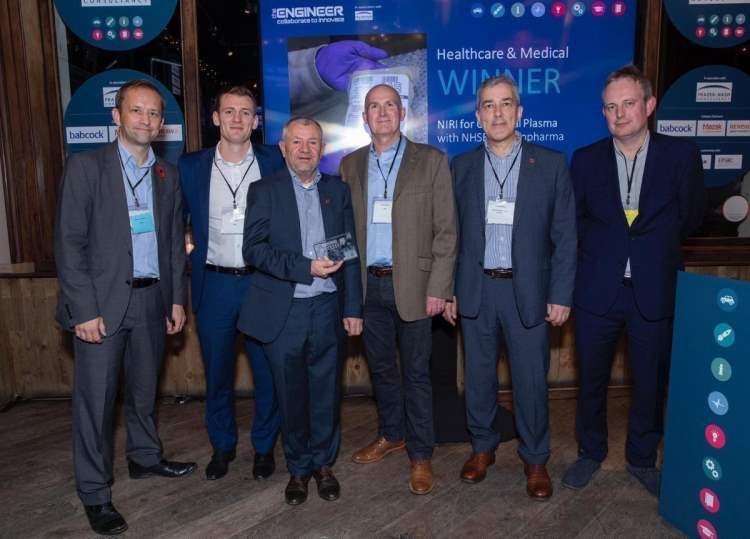NHS Blood and Transplant collaborates on pioneering new plasma filter project
NHS Blood and Transplant (NHSBT) has embarked on a three-year collaborative project to produce a universal plasma filtration system that will mean patients who need transfusions won’t have to wait for blood-matched plasma.
NHS Blood and Transplant is partnering with Nonwovens Innovation and Research Institute (NIRI) and Macopharma to scale up, ready for commercialisation, a filter which enables plasma to be transfused to patients regardless of their blood group.
The need
Plasma is the component of blood that that contains the proteins that make blood clot and is often used to treat patients who suffer from severe bleeding after trauma, surgery or childbirth. With the exception of plasma from group AB donors, all other groups of plasma routinely contain anti-A, anti-B or both anti-A and anti-B depending on the donor’s blood group. For this reason, when plasma is to be transfused, it must be compatible with the patient’s red cells in order to avoid the risk of transfusion reactions, which can be severe and may even be fatal.
In emergency situations, a patient’s blood type might not be known so the safest option is to administer group AB plasma that is compatible with all blood types. However, only 4% of the population have AB blood so there are very limited supplies.
The ability to effectively remove specific antibodies by means of a filter would positively impact the safety of the recipient of the blood component, as well as reduce the logistical complexities within Health Services by simplifying inventory and enabling the easy supply of antibody-free blood components to patients.
The project
 NHS Blood and Transplant have embarked on a three-year project in collaboration with Nonwovens Innovation and Research Institute (NIRI) and Macopharma to produce a universal plasma filtration system that will mean patients who desperately need transfusions won’t have to wait for blood matched plasma. This business-driven, collaborative project is led by the NHS Blood and Transplant (NHSBT), and draws on the expertise of the partner organisations, each providing unique knowledge and input to the project.
NHS Blood and Transplant have embarked on a three-year project in collaboration with Nonwovens Innovation and Research Institute (NIRI) and Macopharma to produce a universal plasma filtration system that will mean patients who desperately need transfusions won’t have to wait for blood matched plasma. This business-driven, collaborative project is led by the NHS Blood and Transplant (NHSBT), and draws on the expertise of the partner organisations, each providing unique knowledge and input to the project.
The Universal Plasma project was founded to upscale a new filtration technology, developed by NIRI, and has been awarded a grant of £1.13m by National Institute for Health Research (NIHR) ‘Invention for Innovation’ that advances medical devices for increased patient benefit in areas of existing or emerging clinical need. The technology has been well received and the project team has received two awards, including the ICiPS 2017 Collaboration award and more recently The Engineer Collaborate to Innovate award 2018.
Project timeline:
- 2011 - Feasibility (TSB grant project, 2011): NIRI developed immunoadsorption filter concept and with positive test results (NHSBT).
- 2012 - Early stage development (IUK grant funded project, 2012): Sanguis Consortium Formed: NIRI/ Macopharma/ NHSBT/ Carbosynth).
- 2018 – Universal Plasma (NIHR grant project): Upscale development of immunoadsorption filter concept (NHSBT/ NIRI/ Macopharma).
In addition to bringing benefits in terms of patient welfare, it is envisaged that the technology will bring significant savings to the NHS from improvements in wastage, logistics, administration and emergency delivery costs
Contact
For further information with regards to the project or the technology, please contact Melanie Munro, Programme Manager - Universal Plasma Programme, NHS Blood and Transplant.
Collaborators
The National Institute for Health Research (NIHR) is the nation's largest funder of health and care research. The NIHR:
- Funds, supports and delivers high quality research that benefits the NHS, public health and social care
- Engages and involves patients, carers and the public in order to improve the reach, quality and impact of research
- Attracts, trains and supports the best researchers to tackle the complex health and care challenges of the future
- Invests in world-class infrastructure and a skilled delivery workforce to translate discoveries into improved treatments and services
- Partners with other public funders, charities and industry to maximise the value of research to patients and the economy
The NIHR was established in 2006 to improve the health and wealth of the nation through research, and is funded by the Department of Health and Social Care. In addition to its national role, the NIHR commissions applied health research to benefit the poorest people in low- and middle-income countries, using Official Development Assistance funding.
